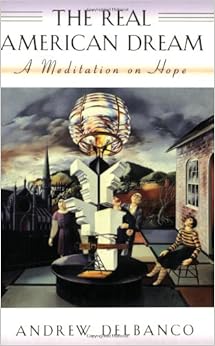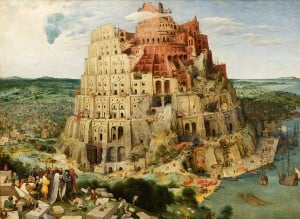I place before you two quotes: one from a Columbia scholar who has studied American higher education, the other from Pope Francis.
 1. First, Andrew Delbanco, from his book The Real American Dream, a collection of essays given originally as the 1999 William E. Massey Sr. Lectures in the History of American Civilization at Harvard University. Delbanco is interested in the ways that American society has been organized around three key foci of declining expansiveness: God (as in Puritan society), nation (as a transcendent community worth fighting for) and self (as an isolated ego seeking some meaning). Harvard University Press describes Delbanco’s book as follows.
1. First, Andrew Delbanco, from his book The Real American Dream, a collection of essays given originally as the 1999 William E. Massey Sr. Lectures in the History of American Civilization at Harvard University. Delbanco is interested in the ways that American society has been organized around three key foci of declining expansiveness: God (as in Puritan society), nation (as a transcendent community worth fighting for) and self (as an isolated ego seeking some meaning). Harvard University Press describes Delbanco’s book as follows.
Since we discovered that, in Tocqueville’s words, “the incomplete joys of this world will never satisfy the heart,” how have we Americans made do? In The Real American Dream literary scholar Andrew Delbanco shows how Americans have organized their days and ordered their lives—and ultimately created a culture—to make sense of the pain, desire, pleasure, and fear that are the stuff of human experience. In a time of cultural crisis, when the old stories seem to be faltering, this book offers a lesson in the painstaking remaking of the American dream.
It is within this book that Delbanco makes a broad claim about the “declension” of the American dream. In summarizing his argument, he points to the lacuna at the heart of this dream.
I stand by my claim that the most striking feature of contemporary culture is the unslaked craving for transcendence.
In short: when a nation loses God, it stoops toward a diminished form of transcendence, the nation. (In what has transpired in recent years since the publication of his book, one might also observe that it also slouches toward a corrupt form of nationalism: the tribe.) Delbanco goes on to say that upon losing the nation as a source of transcendence–exemplified by Abraham Lincoln–there is a collapse into the self and its passions, with “no way of organizing desire into a structure of meaning.” We have lost transcendence.
2. Pope Francis, speaking to a congress of religious educators on the 50th anniversary of the Declaration on Christian Education (Gravissimum Educationis) and on the 25th anniversary of St. John Paul II’s Ex Corde Ecclesiae on Catholic universities, suggested a new way of considering the key task of Catholic education.
To educate in a Christian way is to lead young people, children, in human values in the whole of reality, and one of these realities is transcendence. Today there is the tendency to neo-positivism, that is, to educate in immanent things, to the value of immanent things, and this happens in countries of Christian tradition and in countries of pagan tradition. And this is not to introduce youngsters and children in the total reality: transcendence is lacking. For me, the greatest crisis of education, in the Christian perspective, is being closed to transcendence.
It is possible, I think, to consider the pope’s call in light of Delbanco’s critique. Transcendence–or, minimally, the desire for it–is an eros for truth, goodness, and beauty. In education, it is the regular question “but what does it mean?”–regardless of the field of study. It is the answer to John Haughey’s question “Where is knowing going?” in his book of the same title. It is worth observing that the pope clearly excludes proselytism from the introduction to transcendence– elsewhere he called proselytism “solemn nonsense.” Rather, he seems to be suggesting that–as Delbanco suggests–individuals and societies collapse without some transcendence that animates their shared lives.











